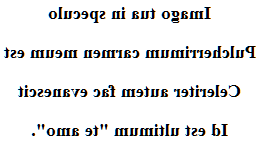Latin love poem
Speculum
Imago tua in speculo
Pulcherrimum carmen meum est
Celeriter autem fac evanescit
Id est ultimum "te amo".


→ French poem ←
Latin language
Translating my love poem in Latin was difficult, my Latin versions are far away. Latin is the language of our history. I feel that it will be a good idea to declaim these 4 verses, under the windows of your beloved.
Latin the language of ancient Rome, remains official language in the Vatican. Beginning as a local dialect of a small village on the river Tiber, it spread in the course of history over a large portion of the globe. The Roman conquests were so important that Latin has diffuse over a vast territory and its influence remained immense.
In the middle ages Latin served as the international medium of communications, as well as the language of science, theology and philosophy. The theologians Desiderius Erasmus and John Calvin write in Latin, Copernicus and Isaac Newton too. Until comparatively recent times a knowledge of Latin was an essential prerequisite to any liberal education. The Roman Catholic Church has traditionally used Latin as its official and liturgical language. Many Romance languages come from this italic language.
Its alphabet is also the one used by the most languages in the world, and in the 7th century BC it consists of 23 letters (i and u vowels are not distinguished from i and u consonants). The Latin distributed in Europe by the Roman conquests, then the Christianization, gives birth to many Romance languages (so-called vulgar), that is to say, spoken by the masses. This movement tends to strengthen its power as a common, learned language.
Until 17th S., scientists from different European countries communicate in Latin. It's the language of the universities. It is only from the end of the Renaissance that this use is withers. The Latin mingled in the inconcient with the religious and classical truths that it has conveyed, recedes to the benefit of modern languages.
1637 the discourse of the method by Descartes is published in French.
Romance languages should not be considered a later step in the continuity of Latin. If they are from the Latin, they are no less new idioms.
Latin literature
The first Latin writers are polygraphists and, unlike Greece, several literary genres appear simultaneously in Rome.
Livius Andronicus, Naevius and Ennius find in the Italian traditions the inspiration of their epics. Plautus and Terence write their comedies. Prose appears later than poetry, and it is Cato the Elder who first, in a still clumsy language, composes many historical, oratory, and technical works in prose.
The Latin poets of the first century find in the Alexandrian literature a taste for the minor genres, the refinement of expression and sentiment, That highlights Catullus poetry.
In the 1st century the influence of the declamation schools is crucial for the poems. The poetry very fashionable in worldly circles, is confined to circumstance works such as those of Calpurnius Siculus and Stace.
The epic poems of Rome's golden age 1 century BC, such as Virgil's Aeneid and Horace's Odes, are among the classics of world literature.